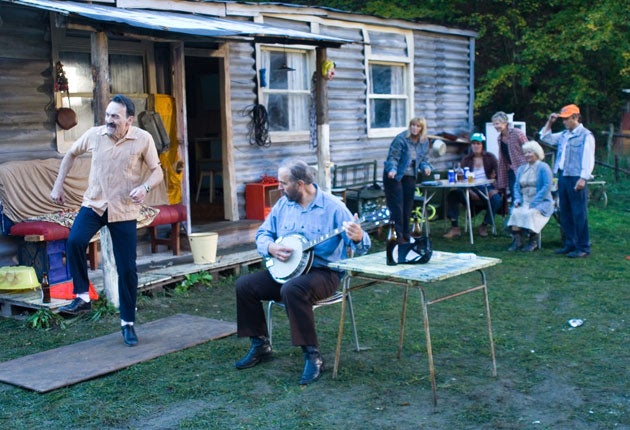White Lightnin', Dominic Murphy, 92 mins, (18)
No cliché about American hillbilly life is left unturned in this messy biopic about an obscure dancer from the Appalachian mountains. Unfortunately, there's not much of a story either

Inspired by the life of Appalachian mountain dancer Jesco White, White Lightnin' is (for me, at least) an example of that select sub-genre, Biopics of People You've Never Heard of.
Apparently, White is a living legend, a muse to such acts as The Kentucky Headhunters, Sam Black Church, Trailer Bride and Ekoostik Hookah – but then, I've never heard of them either. So I Googled ol' Jesco, and still wasn't entirely convinced that he existed. It was only when I got to his YouTube clips (dancing as a lithe young buck; sporting Methusaleh's beard; threatening to kill his wife if she kept serving him "sloppy eggs") that I had to accept that he probably was real. (Still, it can't be long before some ingenious makers of a fake biopic manage to plant enough bogus internet material to turn fiction into truth, Borges-style.)
That said, Dominic Murphy's film clearly plays fast and loose: this is an apocalyptic fantasy about a folk hero who's essentially a platonic ideal of Elvis, Jerry Lee Lewis and Fred Astaire, all mashed together in an ol' fruit jar and stamped with a limited-edition label designed by Nick Cave. The film begins as white-trash misery memoir, with Jesco (Edward Hogg) reminiscing in voice-over about how, back in the boondocks of Boone County, his young self would spend his time carving crucifixes into his arm and huffin' (sniffing gasoline and lighter fluid). In walks Mom to find him in a pool of blood: "Jeesus! He's on the gas agin!"
Back from reform school, Jesco returns to his family's shack, where his father D Ray (the mightily grizzled Muse Watson) tries to straighten his boy out by teaching him the art of mountain dancing: before long, Jesco literally steps into Daddy's shoes. But for all Jesco's skill, he's soon doing more huffin' than hoofin', growing a crazed mop of mountain-man beard and muttering balefully about the men who, one dark night, done wrong by his Paw: "Some thought that vengeance is best left to the Lord ..."
One of the unlikeliest films yet to bear the UK Film Council stamp, this partly Croatian-shot production represents an extreme case of nostalgie de la boue – that means hankerin' for mud, boy, and I mean a lot of mud. The depiction of hillbilly life is a Hogarthian panorama of grizzled grotesques that does for the dignity of Appalachian working folk what Borat did for rural Kazakhstan.
British actor Hogg is charismatic as Jesco in his prime, slicked-back hair and legs limber in Michael Jackson socks. And he has a nice lustful rapport with the older woman, Cilla, who runs off with him: it may be novelty casting to have Carrie Fisher play such a cheerfully raunchy part, but she brings considerable warmth to the film, gamely playing up in such scenes as a jolly lesson on the pros and cons of mixing oral sex with chilli peppers.
But as Jesco gets ever more bristly and manic, Hogg's performance has nowhere to go but a thicket of feral gurning, and even in his most unhinged moments, those are still disconcertingly Hogg's matinee-idol eyes glimmering from that hellhound visage.
Director Murphy's visual choices never quite cohere, caught between stylisation and grubby realism: the sequences of Jesco's boyhood seem unduly aestheticised, the colour bled to a glazed near-monochrome. But in the final stretch, as the film hits full psych-out mode, it rather compellingly takes on the fried textures of a third-generation bootleg copy of an Eighties video nasty. There may be a hell of a story here, but given the film's confusing relation to the facts, it's hard to know exactly why Jesco White has been singled out for celebration. As for his dancing, which we see relatively little of, to be honest it looks a bit, well ... girly, its basic steps not dissimilar to Shirley Temple doing "The Good Ship Lollipop".
A knowing attempt to make an instant cult classic, a kind of grade-Z Walk the Line, White Lightnin' comes across as somewhat callous, treating its hillbilly milieu largely as Gothic exoticism. There's no point complaining that it's exploitative, since it's targeted at the hipster constituency for whom "exploitation" is a positive buzzword. But in the end, White Lightnin' is more mess than madness – a jar of moonshine that should be labelled "Appalachian non contrôlé".
Join our commenting forum
Join thought-provoking conversations, follow other Independent readers and see their replies
Comments
Bookmark popover
Removed from bookmarks